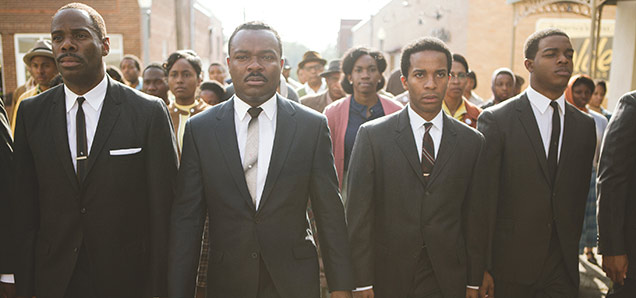Would you march with them?
 CREDIT: PARAMOUNT PICTURES
CREDIT: PARAMOUNT PICTURESSelma follows Martin Luther King Jr. and his fight for voting rights.
In 1965, the Civil Rights movement was in full swing, with non-violent protests led by Martin Luther King, Jr. making strides in creating a more equal world for everyone. One of the largest of these protests was a march from Selma, Alabama to the state capitol, Montgomery, in support of equal voting rights for African-Americans.
Selma follows key individuals in the lead-up to this historic event, demonstrating the cruelties of those in power and the determination of those without.
It’s difficult to criticize a film that expresses such a critical moment in history, with such important and powerful personalities. David Oyelowo did an amazing job depicting King, looking and sounding the part. Oyelowo expressed a depth of emotion and internal conflict that demonstrated the struggle of leading a group to risk their lives, of listening to threats to his loved ones and still having the strength to fight for an essential cause.
The rest of the cast did a great job, although one can tell the film is made for an American audience with the historical background to know the names. There is some exposition in the form of FBI transcripts that seem a bit awkward at first but begin to feel natural as the movie progresses. The overarching sense of every move being watched and documented is clear, and the disconcerting feeling of Big Brother hiding in the bushes pervades.
The one complaint is stylistic. There are some moments of great tragedy that use shock effectively and others where time is slowed for no particular reason. While probably intended to be dramatic and artistic, this instead just breaks the rhythm of the scene and takes the audience out of the moment. It’s an unfortunate addition to a movie that is otherwise beautifully done.
Selma is heartbreaking in its portrayal of the struggle to acquire the right to vote unfettered. Perhaps the hardest part to swallow is that many of King’s speeches are just as relevant today as they were in 1965.
Despite the signing of the Voting Rights Act, many minorities still face obstacles to voting both in the United States and Canada. New bills regarding identification and permanent residence for voters target students, immigrants and minorities, not to mention the fact that power is still very much in the hands of the same people as it always has been. Current events in the United States – especially in Ferguson, Missouri – demonstrate that while things have improved, there is still a long way to go in terms of equality.
Overall, the acting is solid, the plot is accurate to the people and the history, and the direction is excellent. While definitely being Oscar bait, Selma is an important movie. It shows the best way to create a historical film that captures the audience while still maintaining accuracy and showing the truth behind the complex human beings that fronted the movement. King was an amazing individual, and Selma goes a great way towards showing him as a real human being as well as the hero that he is.













